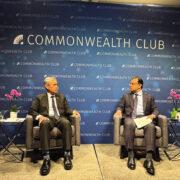THE Pinoys’ plight to travel towards the “straight path” might serve them well in the long run, according to a recent study made by a Singapore-based financial service group.
In its research entitled Asia 2020, the Development Bank of Singapore (DBS) said that the Aquino government’s campaign on curbing corruption could mean more foreign direct investments for the country as it gears up for the next decade.
The study, which also covers 10 other Asian countries, said that the Philippines’ economy will be up by 80 percent by 2020. It also mentioned that “on the back of savings and investment that continue to rise back towards the longer-term average,” GDP growth is also expected to rise at 6 percent as well.
“By 2020, GDP in today’s dollars will likely be 80 percent larger and income levels 45 percent higher,” Eugene Leow of DBS said.
According to the DBS, the rise of the economy will depend in the government’s policies and how the large labor pool and resource endowment can be tapped. Reforms such as the public-private partnership (PPP) program of the incumbent administration and its anti-corruption campaign are also some of the factors that could contribute to the steady economic growth of the country.
Among the most expected economic boosters was the PPP. Seen as the program most likely to draw in a considerable number of investments, the launch of the PPP projects reinvigorated the interest of both foreign and local businessmen that the Philippines would finally be able to step-up in the competition against its neighbor countries.
For a project that requires the partnership of the public and private sector in building infrastructures and services, the PPP may sound like a very good idea. For the businessmen, however, the implementation of these projects has been slower than they have expected.
Makati Business Club (MBC) chairman, Ramon del Rosario, said in a report last October 11 that the private sector’s eagerness to contribute to the economic growth was not matched by the government, “which had opted to tighten its purse strings in an effort to weed out deeply rooted corruption.”
The government’s careful spending was believed to be an effort of prevention that anomalous contracts like the $400-million Terminal 3 project of Ninoy Aquino International Airport or the $329-million NBN-ZTE deal will not happen again.
While he understands the sentiments of the government in avoiding corruption in projects, Del Rosario said that a system without a slightest hint of corruption “does not exist.” The MBC chairman also believes that the government must be courageous enough to engage in these projects with the private sector and spend what needs to be spent.
Socioeconomic Planning Secretary Cayetano Paderanga Jr., also said in the same report that the delay was not only because of the government’s effort to eliminate corruption, but also because certain PPP and non-PPP projects had to be reviewed and streamlined by the Department of Public Works and Highways (DPWH) before being implemented.
Malacañang expects the first big-ticket PPP projects to be auctioned off before the end of the year.
In his speech during the recent unveiling of the P72-billion stimulus package, President Aquino assured that. Some 5.5 billion is alloted for various infrastructure projects under the DPWH.
“We will do what we can within the bounds of economic prudence, and make sure the effects of this growth are felt more widely,” he said.
The decision on whether to spend or to save is not an easy task, especially for a government that is fervently being watched by its constituents who have just came out of a traumatic case of corruption. While good business require careful spending, it also calls for a certain amount of boldness to engage in big steps that will enable the business to level up to the trust and expectations of the business partners and customers.
(www.asianjournal.com)
(NYNJ Oct 14-20, 2011 Sec A pg.6)








